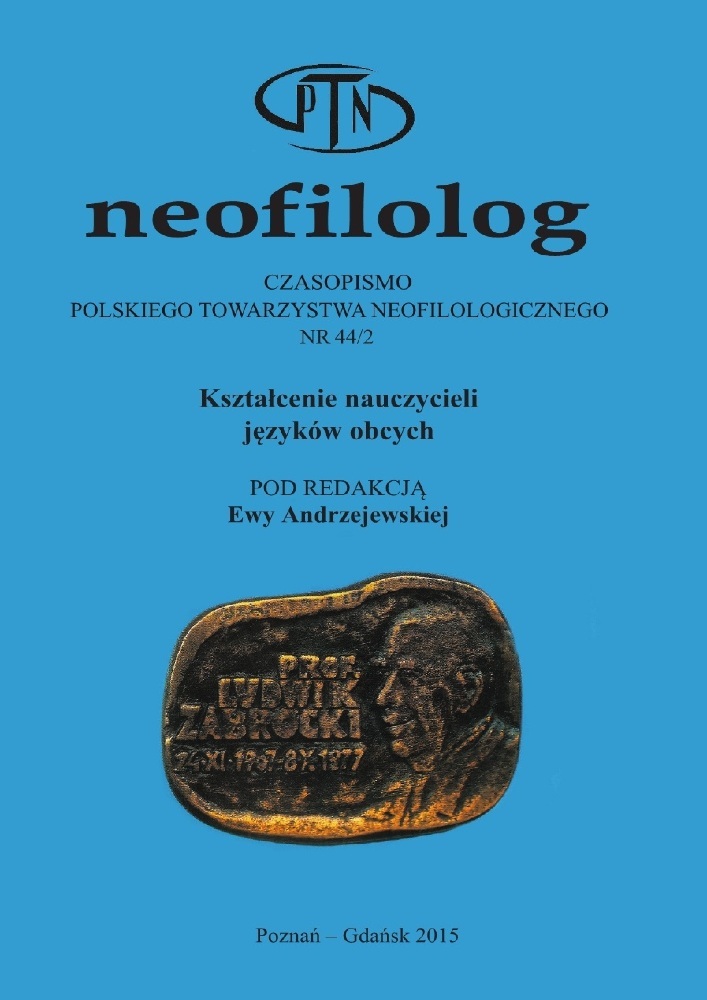Abstract
Becoming a foreign language teacher involves meeting a range of requirements which have mainly been specified in the Decree of the Minister for Science and Higher Education issued on January 17th, 2012, concerning the standards that have to be complied with in teacher education. Education of this kind is still most frequently offered in the course of BA or MA programs in foreign languages, with the crucial caveat that, primarily as a result of decreasing demand for foreign language teachers, this component has been eliminated in many institutions of higher education or students are required to pay for an additional module providing such training. It is assumed that on completion of a BA or MA program as well as obtaining credits for the required courses focusing on pedagogy, a student will have the requisite qualifications to teach a particular foreign language at appropriate educational levels. This implies that, by this time, he or she should have acquired the necessary knowledge, skills and competences, both in the foreign language and in psychological and pedagogical issues, which can ensure effective teaching and learning. The paper aims to subject such assumptions to critical scrutiny, demonstrate that they blatantly fail to take into account the real situation in Polish education, as well as offer some tentative proposals that could enhance the quality of foreign language teacher training in our country.
References
Andrews, S. 2007. Teacher language awareness. Cambridge: Cambridge University Press.
Bartels, N. 2009. „Knowledge about language” (w) The Cambridge guide to second language teacher education (red. A. Burns, J. C. Richards). Cambridge: Cambridge University Press: 125-134.
Borg, S. 2013. „Language teacher education” (w) The Routledge handbook of applied linguistics (red. J. Simpson). London and New York: Routledge: 215-228.
Canale, M. 1983. „From communicative competence to communicative language pedagogy” (w) Language and communication (red. J. C. Richards, R. W. Schmidt). London: Longman: 2-27.
Canale, M., Swain, M. 1980. „Theoretical bases of communicative approaches to second language teaching and testing” Applied Linguistics 1: 1-47.
Coste, D., North, B., Sheils, J. i Trim, J. 2003. Europejski system opisu kształcenia językowego: uczenie się, nauczanie, ocenianie. Warszawa: Wydawnictwa Centralnego Ośrodka Kształcenia Nauczycieli.
Ellis, R. 2009. „Implicit and explicit learning, knowledge and instruction” (w) Implicit and explicit knowledge in second language learning, testing and teaching (red. R. Ellis, S. Loe-wen, C. Elder, R. Erlam, J. Philp i H. Reinders). Bristol: Multilingual Matters: 3-25.
Farrell, T. S. C. 2007. Reflective language teaching: From research to practice. London: Continuum.
Freeman, D. 2001. „Second language teacher education” (w) The Cambridge guide to teaching English to teachers of other languages (red. R. Carter, D. Nunan). Cambridge: Cambridge University Press: 72-79.
Freeman, D., Johnson, K. E. 2005. „Towards linking teacher knowledge and student learning” (w) Second language teacher education: International perspectives (red. D. Tedick). Mahwah, NJ. Lawrence Erlbaum: 73-95.
Graves, K. 2009. „The curriculum of second language teacher education” (w) The Cambridge guide to second language teacher education (red. A. Burns, J. C. Richards). Cambridge: Cambridge University Press: 115-125.
Jourdenais, R. 2009. „Language teacher education” (w) The handbook of language teaching (red. M. H. Long, C. J. Doughty). Oxford: Wiley-Blackwell: 647-658.
Kelly, M., Grenfell, M. 2004. European profile for language teacher education. A frame of reference. Southampton: University of Southampton.
Lafayette, R. 1993. „Subject matter content: What every foreign language teacher needs to know” (w) Developing language teachers for a changing world (red. G. Guntermann). Illinois: National Textbook Company: 124-158.
Medgyes, P. 2001. „When the teacher is a non-native speaker” (w) Teaching English as a second or foreign language (red. M. Celce-Murcia). Boston: Heinle & Heinle: 415-427.
Morton, T., Maguire, T. i Baynham, M. 2006. A literature review of research on teacher education in adult literacy, numeracy and ESOL. London: NRDC.
Pawlak, M. 2010. „Problemy pomiaru wiedzy językowej”. Neofilolog 35: 9-22.
Richards, J. C. 1998. Beyond training. Cambridge: Cambridge University Press.
Richards, J. C., Lockhart, C. 1994. Reflective teaching in second language classrooms. Cambridge: Cambridge University Press.
Rozporządzenie Ministra Nauki i Szkolnictwa Wyższego z dnia 17 stycznia 2012 r. w sprawie standardów kształcenia przygotowującego do wykonywania zawodu nauczyciela.
Roberts, J. 1998. Language teacher education. London: Arnold.
Waters, A. 2005. „Expertise in teacher education” (w) Expertise in second language learning and teaching (red. K. Johnson). New York: Palgrave Macmillan: 201-229.
License
Copyright (c) 2019 Neofilolog

This work is licensed under a Creative Commons Attribution-NoDerivatives 4.0 International License.
Authors
Authors of texts accepted for publication in Neofilolog are required to complete, sign and return to the Editorial team’s office the Agreement for granting a royalty-free license to works with a commitment to grant a CC sub-license.
Under the agreement, the authors of the texts published in Neofilolog grant Adam Mickiewicz University in Poznań a non-exclusive, royalty-free license and authorize the use of Attribution-NoDerivatives 4.0 International (CC BY-ND 4.0) Creative Commons sub-license.
The authors retain the right to the free disposal of the work.
Users
Interested Internet users are entitled to use works that have been published in Neofilolog since 2017, under the following conditions:
▪ attribution – obligation to provide, together with the distributed work, information about the authorship, title, source (link to the original work, DOI) and the license itself.
▪ no derivatives – the work must be preserved in its original form. Without the author's consent, it is not possible to distribute the modified work in the form of translations, publications, etc.
Copyrights are reserved for all texts published since 2017.
Miscellaneous
Adam Mickiewicz University in Poznań retains the property right as a whole (layout, graphic form, title, cover design, logo etc.).
